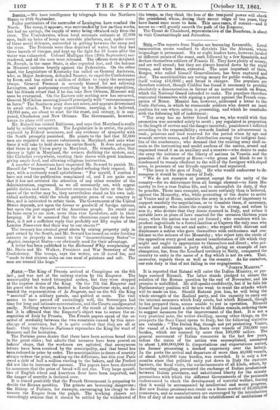Fuller particulars of the amender of Lexington have reached the
North. The camp, it appears, was surrounded by low earthen works, but had no springs, the supply of water being obtained only from the river. The Confederates, whom local accounts estimate at 27,000 men, built up bales of hemp on movable platforms, and, under cover of these novel defences, succeeded in gettine.b between the camp and the river. The Federals were thus deprived of water, but they had three barrels of vinegar, and kept up the fight for 59 hours after the water was exhausted. Colonel Mulligan then (20th September) sur- rendered, and all the men were released. The officers were detained. St. Joseph, in the same State, is also reported lost, and the balance in Missouri inclines heavily against the Federalists. On the other hand, the Legislature of Kentucky has called on General Anderson, who, as Major Anderson, defended Sumter, to expel the Confederates by force, and has raised a million of dollars to equip the necessary troops. General Fremont is severely blamed for not relieving Lexington, and postponing everything to his Mississipi expedition, but his friends retort that if he can take New Orleans, Missouri will soon he evacuated. On the Emtern side nothing new has occurred, General McClellan amusinglhimself principally with "reconnoissances in force." The Southern army does not move, and appears determined to await attack. Two large expeditions, carrying, it is believed, 12,000 men, are about to start for the coast, and occupy, it is sup. posed, Charleston and New Orleans. The Government, however, keeps its plans still secret.
Mr. Russell has visited Baltimore, and says that Maryland is really held by military occupation. The Legislature is in arrest, the police replaced by Federal nominees, and any evidence of sympathy with the South promptly punished. He points to the fact that 37,000 men are required to secure submission in Maryland, and asks what force it will take to hold down the entire South. It does not appear that there is any Union party in Maryland. Ile remarks, also, that i slavery is light n Maryland, the owners disliking the system and, like Catholics everywhere, treating their slaves with great kindness, giving ample food, and allowing religions instruction. •
A number of Americans have requested Mr. Seward to punish Mr. Russell for "treason," and he has replied refusing their request. He says, with a curiously small spitefulness : "For myself, I confess I have not read the publication complained of, and I am quite sure that it has not arrested the attention of any other member of the Administration, engrossed, as we all necessarily are, with urgent public duties and cares. However erroneous the facts or the infer- ences of the writer may be, they nevertheless stand on his own indi- vidual authority, while the whole patriotic press of our country is 'free, and is interested to refute them. The Government of the United States depends, not upon the favour or goodwill of foreign nations, but upon the just support of the American people. Its credit and its fame seem to me now, more than ever heretofore, safe in their keeping. If it be assumed that the obnoxious paper may do harm here, is it not a sufficient reply that probably not fifty copies of the London Times ever find their way to our shores ?"
The treasury has created great alarm by seizing property only in part owned by the South, and Mr. Seward has issued an order limiting seizures to property in transit to the "insurrectionary States"— .ringlice, insurgent States—or obviously used for their advantage. A. letter has been published in the Richmond Whig complaining of Mr. Davis and Mr. Walker, President and War Secretary of the Confederacy. The troops, says the writer, are ill cared for, and "made to trot sixteen miles on one meal of potatoes and salt. The men are treated like hogs."






























 Previous page
Previous page